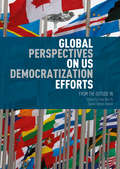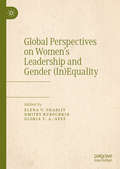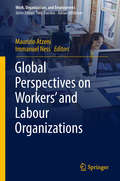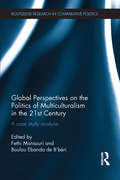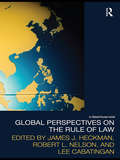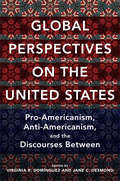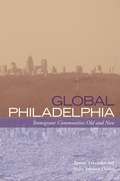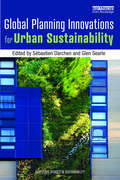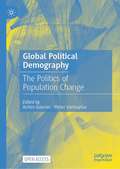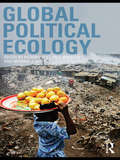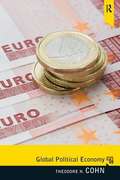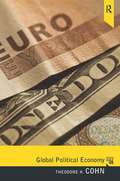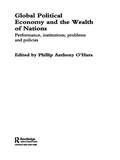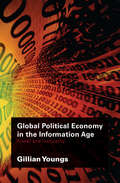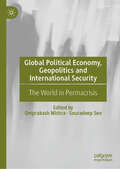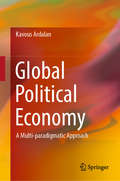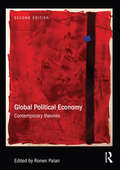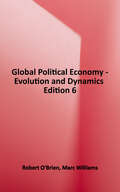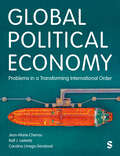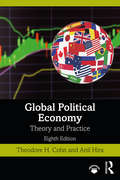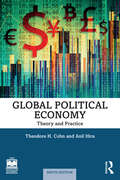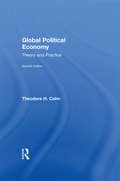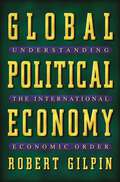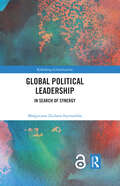- Table View
- List View
Global Perspectives on US Democratization Efforts
by Sally Burt Daniel Aňorve AňorveThis edited volume follows up from Global Perspectives on US Foreign Policy: From the Outside In in providing unique perspectives on US foreign policy from citizens of countries affected. This approach allows the voices of those less commonly heard to be presented as part of the broader debate about US democracy assistance policies around the globe. Contributions from experts in the Middle East, Africa, the Americas, and Eastern Europe are included to ensure the most pressing issues of international relations in our time are addressed. This book should be read by anyone interested in the United States and global politics as it provides a fuller view of the world.
Global Perspectives on Women’s Leadership and Gender (In)Equality
by Elena V. Shabliy Dmitry Kurochkin Gloria Y. A. AyeeThis interdisciplinary volume discusses women’s global leadership and women’s rights advancement, identifying gender inequality as a persisting societal challenge and a major barrier to human development. Drawing on intersectionality as an important analytic and methodological tool, the contributors analyse women’s leadership roles across the world, featuring perspectives on the US, Israel, and Brazil, amongst other countries. The book also contributes to the growing field of leadership, presenting cross-cultural examples and case-studies of outstanding women and female leaders, as well as discussing contemporary leadership theories, and examining obstacles to women’s leadership. Global Perspectives on Women’s Leadership and Gender (In)Equality will be an important point of reference for students and scholars across the political sciences, women’s studies, feminist philosophy, business development, and history.
Global Perspectives on Workers' and Labour Organizations (Work, Organization, And Employment)
by Immanuel Ness Maurizio AtzeniThis book broadens the research on the underworld of precarious and not-represented workers, through a selection of original case studies from across the globe written by leading experts. The book unveils the working conditions affecting this vast labour force that is so important to capital accumulation in the global age. It also helps us to understand the forms and processes of organization that these groups of workers, almost on an everyday basis, put in place to improve their working conditions and lived experiences.
Global Perspectives on the Politics of Multiculturalism in the 21st Century: A case study analysis (Routledge Research in Comparative Politics)
by Fethi Mansouri Boulou Ebanda de B’bériMulticulturalism is now seen by many of its critics as the source of intercultural and social tensions, fostering communal segregation and social conflicts. While the cultural diversity of contemporary societies has to be acknowledged as an empirical and demographic fact, whether multiculturalism as a policy offers an optimal conduit for intercultural understanding and social harmony has become increasingly a matter of polarised public debate. This book examines the contested philosophical foundations of multiculturalism and its, often controversial, applications in the context of migrant societies. It also explores the current theoretical debates about the extent to which multiculturalism, and related conceptual constructs, can account for the various ethical challenges and policy dilemmas surrounding the management of cultural diversity in our contemporary societies. The authors consider common conceptual and empirical features from a transnational perspective through analysis of the case studies of Australia, Canada, Columbia, Germany, New Zealand, the United Kingdom and Uruguay. This book will be of interest to students and scholars of political science, comparative politics, international studies, multiculturalism, migration and political sociology.
Global Perspectives on the Rule of Law (Law, Development and Globalization)
by James J. Heckman Robert L. Nelson Lee CabatinganGlobal Perspectives on the Rule of Law is a collection of original research on the rule of law from a panel of leading economists, political scientists, legal scholars, sociologists and historians. The chapters critically analyze the meaning and foundations of the rule of law and its relationship to economic and democratic development, challenging many of the underlying assumptions guiding the burgeoning field of rule of law development. The combination of jurisprudential, quantitative, historical/comparative, and theoretical analyses seeks to chart a new course in scholarship on the rule of law: the volume as a whole takes seriously the role of law in pursuing global justice, while confronting the complexity of instituting the rule of law and delivering its promised benefits. Written for scholars, practitioners, and policy-makers, Global Perspectives on the Rule of Law offers a unique combination of jurisprudential and empirical research that will be provocative and relevant to those who are attempting to understand and advance the rule of law globally. The chapters progress from broad questions regarding current rule of development efforts and the concept of rule of law to more specific issues pertaining to economic and democratic development. Specific countries, such as China, India, and seventeenth century England and the Netherlands, serve as case studies in some chapters, while broad global surveys feature in other chapters. Indeed, this impressive scope of research ushers in the next generation of scholarship in this area.
Global Perspectives on the United States: Pro-Americanism, Anti-Americanism, and the Discourses Between
by Jane Desmond Virginia DominguezThis daring collaborative effort showcases dialogues between international scholars engaged with the United States from abroad. The writers investigate the analytic methods and choices that label certain talk, images, behaviors, and allusions as "American" and how to read the data on such material. The editors present the essays in pairs that overlap in theme or region. Each author subsequently comments on the other's work. A third scholar or team of scholars from a different discipline or geographic location then provides another level of analysis. Contributors: Andrzej Antoszek, Sophia Balakian, Zsófia Bán, Sabine Bröck, Ian Condry, Kate Delaney, Jane C. Desmond, Virginia R. Dominguez, Ira Dworkin, Richard Ellis, Guillermo Ibarra, Seyed Mohammad Marandi, Giorgio Mariani, Ana Mauad, Loes Nas, Edward Schatz, Manar Shorbagy, Kristin Solli, Amy Spellacy, and Michael Titlestad.
Global Philadelphia: Immigrant Communities Old and New
by Mary Johnson Takenaka Ayumi OsirimThe racial and ethnic composition of Philadelphia continues to diversify as a new wave of immigrants—largely from Asia and Latin America—reshape the city’s demographic landscape. Moreover, in a globalized economy, immigration is the key to a city’s survival and competitiveness. The contributors to Global Philadelphiaexamine how Philadelphia has affected its immigrants’ lives, and how these immigrants, in turn, have shaped Philadelphia. Providing a detailed historical, ethnographic, and sociological look at Philadelphia’s immigrant communities, this volume examines the social and economic dynamics of various ethnic populations. Significantly, the contributors make comparisons to and connections between the traditional immigrant groups—Germans, Italians, the Irish, Jews, Puerto Ricans, and Chinese—and newer arrivals, such as Cambodians, Haitians, Indians, Mexicans, and African immigrants of various nationalities. While their experiences vary, Global Philadelphia focuses on some of the critical features that face all immigrant groups—intra-group diversity, the role of institutions, and ties to the homeland. Taken together, these essays provide a richer understanding of the processes and implications of contemporary immigration to the area.
Global Planning Innovations for Urban Sustainability (Routledge Studies in Sustainability)
by Sébastien Darchen Glen SearleAs the world becomes more urbanised, solutions are required to solve current challenges for three arenas of sustainability: social sustainability, environmental sustainability and urban economic sustainability. This edited volume interrogates innovative solutions for sustainability in cities around the world. The book draws on a group of 12 international case studies, including Vancouver and Calgary in Canada, San Francisco and Los Angeles in the US (North America), Yogyakarta in Indonesia, Seoul in Korea (South-East Asia), Medellin in Colombia (South America), Helsinki in Finland, Freiburg in Germany and Seville in Spain (Europe). Each case study provides key facts about the city, presents the particular urban sustainability challenge and the planning innovation process and examines what trade-offs were made between social, environmental and economic sustainability. Importantly, the book analyses to what extent these planning innovations can be translated from one context to another. This book will be essential reading to students, academics and practitioners of urban planning, urban sustainability, urban geography, architecture, urban design, environmental sciences, urban studies and politics.
Global Political Demography: The Politics of Population Change
by Pieter Vanhuysse Achim GoerresThis open access book draws the big picture of how population change interplays with politics across the world from 1990 to 2040. Leading social scientists from a wide range of disciplines discuss, for the first time, all major political and policy aspects of population change as they play out differently in each major world region: North and South America; Sub-Saharan Africa and the MENA region; Western and East Central Europe; Russia, Belarus and Ukraine; East Asia; Southeast Asia; subcontinental India, Pakistan and Bangladesh; Australia and New Zealand. These macro-regional analyses are completed by cross-cutting global analyses of migration, religion and poverty, and age profiles and intra-state conflicts. From all angles, this book shows how strongly contextualized the political management and the political consequences of population change are. While long-term population ageing and short-term migration fluctuations present structural conditions, political actors play a key role in (mis-)managing, manipulating, and (under-)planning population change, which in turn determines how citizens in different groups react.
Global Political Ecology
by Richard Peet Paul Robbins Michael WattsThe world is caught in the mesh of a series of environmental crises. So far attempts at resolving the deep basis of these have been superficial and disorganized. Global Political Ecology links the political economy of global capitalism with the political ecology of a series of environmental disasters and failed attempts at environmental policies. This critical volume draws together contributions from twenty-five leading intellectuals in the field. It begins with an introductory chapter that introduces the readers to political ecology and summarizes the books main findings. The following seven sections cover topics on the political ecology of war and the disaster state; fuelling capitalism: energy scarcity and abundance; global governance of health, bodies, and genomics; the contradictions of global food; capital’s marginal product: effluents, waste, and garbage; water as a commodity, a human right, and power; the functions and dysfunctions of the global green economy; political ecology of the global climate, and carbon emissions. This book contains accounts of the main currents of thought in each area that bring the topics completely up-to-date. The individual chapters contain a theoretical introduction linking in with the main themes of political ecology, as well as empirical information and case material. Global Political Ecology serves as a valuable reference for students interested in political ecology, environmental justice, and geography.
Global Political Economy
by Theodore H. CohnPraised for its authoritative coverage, Global Political Economy places the study of IPE in its broadest theoretical context. This text not only helps students understand the fundamentals of how the global economy works but also encourages them to use theory to more fully grasp the connections between key issue areas like trade and development. Written by a leading IPE scholar, Global Political Economy equally emphasizes theory and practice to provide a framework for analyzing current events and long-term developments in the global economy.
Global Political Economy (Sixth Edition)
by Theodore H. CohnThis text not only helps students understand the fundamentals of how the global economy works but also encourages them to use theory to more fully grasp the connections between key issue areas like trade and development. Written by a leading IPE scholar, Global Political Economy equally emphasizes theory and practice to provide a framework for analyzing current events and long-term developments in the global economy.
Global Political Economy and the Wealth of Nations: Performance, Institutions, Problems and Policies
by Phillip O'HaraThis comprehensive collection documents the major processes, performance, institutions, problems and policies associated with global political economy. For the first time in a single volume, the authors present a detailed analysis of the changing distribution and production of wealth throughout the world, different measures of performance, the glob
Global Political Economy in the Information Age: Power and Inequality
by Gillian YoungsIntroduction: 20th-21st century imaginings and realities Section 1: Time/Space Frameworks 1. States and Markets: understanding geospatial time 2. Virtual Realities: exploring sociospatiality 3. The Political Economy of Time: historical time, speed and mobility Section 2: Borders and Inequality 4. Transcendence and Communication 5. Inequality as Driver 6. Embedding Patriarchy: feminism and inequality in the Internet era Section 3: Technofutures and Power 7. Complex Hegemony in the 21st Century: power and inequality Conclusion
Global Political Economy, Geopolitics and International Security: The World in Permacrisis
by Omprakash Mishra Souradeep SenThe volume delves into the intricate web of contemporary permacrisis rooted in the strategic imperatives of nation-states. Through a historical lens, it navigates the evolving landscape of international politics, tracing the transition of power dynamics from purely military to a fusion of economic and military prowess. The contributions in the volume argue that this shift has redefined the traditional balance of power, with economic instruments emerging as potent tools for geopolitical manoeuvring. Examining the interplay of geopolitical, geoeconomic, and security imperatives, it scrutinises the complex relationships that often perpetuate crises instead of global stability. It sheds light on the unprecedented hybridity of modern warfare, where military and economic dimensions intertwine, exemplified by the ongoing tensions between the liberal international order on the one hand, and Russia and China on the other. Recognising this complexity, the volume raises concerns about the uneven capacity of states to navigate these imperatives. Beneficial for specialists in International Relations and Strategic Studies, policymakers, security experts, scholars, and postgraduate students, this comprehensive volume offers insights into the intricate dynamics of geopolitics, political economy, and security issues of our time.
Global Political Economy: A Multi-paradigmatic Approach
by Kavous ArdalanThis book applies a multiparadigmatic philosophical frame of analysis to the global political economy. Crossing two disciplines and lines of literature—social philosophy and global political economy—this book considers seven aspects of global political economy and discusses each aspect from four diverse paradigmatic viewpoints: functionalist, interpretive, radical humanist, and radical structuralist. The four paradigms are founded upon different assumptions about the nature of social science and the nature of society. Each paradigm generates theories, concepts, and analytical tools which are different from those of other paradigms; developing an understanding of the different paradigms leads to a better understanding of the multi-faceted nature of the subject matter. In this book, the first chapter reviews the four paradigms. Each of the next seven chapters provides four paradigmatic explanations for each of the seven aspects of the global political economy. The final chapter concludes by recommending further paradigmatic diversity. This book will be of particular interest to students and researchers interested in political economy, heterodox economics, political science and international relations.
Global Political Economy: Contemporary Theories
by Ronen PalanGlobal Political Economy (GPE) is a broad and varied field of study and draws insight from a great number of fields and approaches. One of the serious problems confronting academics and students is the sheer mass of theories and debates in the field. This textbook provides up-to-date summaries of the debates and approaches that are currently at the forefront of both European and American GPE. This new revised and expanded second edition contains updated versions of most of the original chapters. In addition, there is a new section entitled ‘Emerging issues in contemporary Global Political Economy (GPE)’ and six new chapters. The second edition is structured around three themes: Part I focuses on the six central concepts of GPE: state, firm, power, labour, finance and globalization. Each one of them has been increasingly subjected to a rigorous and critical evaluation in recent scholarship. Part II covers a select number of theories and debates currently at the forefront of GPE: game theory; behavioural economics; neo-, sociological and evolutionary institutionalism; neo-Marxism; development and post-development; libidinal economies; and economic constructivism. Part III, which is new to this edition, is entitled ‘Emerging issues in contemporary Global Political Economy (GPE)’ and focuses on war, state and International Political Economy (IPE); race, gender and culture; environmental politics; and the rise of China. This is essential reading for all serious scholars and advanced students of IPE.
Global Political Economy: Evolution and Dynamics, 6th ed
by Robert O'Brien Marc WilliamsOffering an accessible introduction to both the historical roots and the contemporary dynamics of today’s world economy, the extensively revised sixth edition of this bestselling textbook continues to lead the way in equipping students with the knowledge required to make sense of the fast-paced discipline of Global Political Economy. Illustrating the breadth of the subject, the book’s authors – both highly regarded experts in the field – show how the national and international interact, while also placing an emphasis on the historical evolution of the world economy in order to appreciate the nuances of today’s economic structures. The global economy is traced from the Industrial Revolution through each phase of a shifting world order to the modern day. Then follows an engaging exploration of the dynamics of today’s economy, including trade, production, finance, labour, gender, development, the environment, security and governance. This takes into account the latest developments in the global economy, from automation and the challenges posed to the labour force to artificial intelligence and the increasingly complex global supply chains of modern transnational firms. This is the most authoritative and accessible textbook on global political economy, making it the ideal companion for students at undergraduate and postgraduate levels, on Politics, International Relations and related degrees.
Global Political Economy: Problems in a Transforming International Order
by Jean Marie Chenou Ralf Juan Leiteritz Carolina Urrego-SandovalTaking first the profound transformations underway in the global political economy, this pathbreaking new text redefines how we understand trade, finance, money and labour. In this new problem-based approach, the core concerns of the global economy are joined by key topics, spanning energy to development, inequalities to illicit economies, reflecting the fluid and dynamic nature of contemporary GPE scholarship. The book addresses four major transformations shaping the global political economy today: the questioning of the liberal international order, the rise of the Anthropocene, the technological advancements of the fourth industrial revolution, and the increasing significance of identity politics. These transformations are explored through a comprehensive framework that integrates diverse theoretical and methodological approaches, ensuring a nuanced understanding of real-world problems. Each chapter tackles key problems and global issues, from global energy dependency and rising inequality to the commodification of personal data and platform economies. The book also emphasises the need for a truly global perspective, integrating lenses, concepts, voices, and ideas from scholarship all round the world. This inclusive approach broadens understanding and reflects the complexity and diversity of the global landscape. By adopting the stance of "hybrid GPE scholars," the authors bridge the gap between different geographical and intellectual traditions, offering a rich and varied examination of contemporary GPE. Global Political Economy is an essential resource, providing a fresh and relevant perspective on the field. It fosters critical discussions and debates, encouraging readers to rethink entrenched beliefs and engage with the ever-evolving landscape of global political economy.
Global Political Economy: Problems in a Transforming International Order
by Jean Marie Chenou Ralf Juan Leiteritz Carolina Urrego-SandovalTaking first the profound transformations underway in the global political economy, this pathbreaking new text redefines how we understand trade, finance, money and labour. In this new problem-based approach, the core concerns of the global economy are joined by key topics, spanning energy to development, inequalities to illicit economies, reflecting the fluid and dynamic nature of contemporary GPE scholarship. The book addresses four major transformations shaping the global political economy today: the questioning of the liberal international order, the rise of the Anthropocene, the technological advancements of the fourth industrial revolution, and the increasing significance of identity politics. These transformations are explored through a comprehensive framework that integrates diverse theoretical and methodological approaches, ensuring a nuanced understanding of real-world problems. Each chapter tackles key problems and global issues, from global energy dependency and rising inequality to the commodification of personal data and platform economies. The book also emphasises the need for a truly global perspective, integrating lenses, concepts, voices, and ideas from scholarship all round the world. This inclusive approach broadens understanding and reflects the complexity and diversity of the global landscape. By adopting the stance of "hybrid GPE scholars," the authors bridge the gap between different geographical and intellectual traditions, offering a rich and varied examination of contemporary GPE. Global Political Economy is an essential resource, providing a fresh and relevant perspective on the field. It fosters critical discussions and debates, encouraging readers to rethink entrenched beliefs and engage with the ever-evolving landscape of global political economy.
Global Political Economy: Theory and Practice
by Anil Hira Theodore H. CohnPraised for its authoritative coverage, Global Political Economy places the study of IPE in broad theoretical context and has been updated to cover the rise of populism, Brexit, the USMCA, US–China trade wars, tariffs, refugees and global migration, the Keynesian–monetarist debate, Fordism, automation, the "gig" economy, global value chains, climate change, cryptocurrencies, and the residual effects of global economic crises and regional relationships and impacts. Written by leading IPE scholar Theodore Cohn, now joined by his prolific colleague Andy Hira, this book equally emphasizes theory and practice to provide a framework for analyzing current events and long-term developments in the global economy. This text is suitable for both introductory and advanced IPE courses. New to the Eighth Edition Expands upon the growing US–China competition in many areas of the global political economy. Discusses the problems Brexit is posing for Britain and the European Union (EU). Explores the growth of populism. Focuses more on environmental degradation/climate change along with the increase in global migration. Incorporates a new theme of South–South global economic relations. Highlights the relationship among economics, geopolitics, and security issues. Emphasizes the importance of global value chains. Looks at the potential for future global financial crises. Updates and expands the number of tables, figures, and graphics throughout. Provides an updated Test Bank and new PowerPoint slides in an Instructor’s e-Resource.
Global Political Economy: Theory and Practice
by Anil Hira Theodore H. CohnGlobal Political Economy places the study of IPE in broad theoretical context, equally emphasizing theory and practice to provide a framework for analyzing current events and long-term developments in the global economy.Andy Hira updates this essential book and the related instructor and student resources, to cover recent global developments and shifts in scholarship.New and updated for the Ninth Edition • Provides an economics primer on how markets, interest, and exchange rates work, comparative advantage, and monetary and fiscal policy; and material on getting a job in political economy.• Includes the basic tenets of realism.• Expands coverage on China, including on bipolarity/U.S. relations, security-economic tradeoffs, Taiwan, the Belt and Road Initiative, and the failure of TPP.• Discusses Russia’s invasion of Ukraine and builds on the material on sanctions.• Investigates the effects of the pandemic, including post-pandemic inflation.• Explores critical approaches to IR and different theoretical perspectives, and gives more weight to the Global South, including postcolonialism and intersectionality.• Focuses more on climate change and the environment, technological advances, and migration.• Adds material on club goods, cryptocurrencies, labor rights, global tax and offshoring, socially responsible investment, corporate social responsibility, the “Beijing Model,” the proposed global minimum tax, ASEAN, and the African Continental Free Trade Agreement.• Updates the tables, figures, graphics, references, and supplementary readings throughout.• Provides updated instructor resources including a Test Bank, PowerPoint slides, Exercises, and an Instructor’s Manual, and a new student website with practice quizzes, flashcards, lecture videos, and links to extensive additional resources including videos, podcasts, readings, and data sources to support learning and engagement.Praised for its authoritative coverage, Global Political Economy is essential reading for both introductory and advanced IPE courses.
Global Political Economy: Theory and Practice
by Theodore H. CohnPraised for its authoritative coverage, Global Political Economy places the study of international political economy (IPE) in its broadest theoretical contextnow updated to cover the continuing global economic crisis and regional relationships and impacts. This text not only helps students understand the fundamentals of how the global economy works but also encourages them to use theory to more fully grasp the connections between key issue areas like trade and development. Written by a leading IPE scholar, this text equally emphasizes theory and practice to provide a framework for analyzing current events and long-term developments in the global economy. New to the Seventh Edition Focuses on the ongoing global economic crisis and the continuing European sovereign debt crisis, along with other regional economic issues, including their implications for relationships in the global economy. Offers fuller and updated discussions of critical perspectives like feminism and environmentalism, and includes new material differentiating among the terms neomercantilism, realism, mercantilism, and economic nationalism. Updated, author-written Test Bank is provided to professors as an e-Resource on the book's Webpage.
Global Political Economy: Understanding the International Economic Order
by Robert G. GilpinThis book is the eagerly awaited successor to Robert Gilpin's 1987 The Political Economy of International Relations, the classic statement of the field of international political economy that continues to command the attention of students, researchers, and policymakers. The world economy and political system have changed dramatically since the 1987 book was published. The end of the Cold War has unleashed new economic and political forces, and new regionalisms have emerged. Computing power is increasingly an impetus to the world economy, and technological developments have changed and are changing almost every aspect of contemporary economic affairs. Gilpin's Global Political Economy considers each of these developments. Reflecting a lifetime of scholarship, it offers a masterful survey of the approaches that have been used to understand international economic relations and the problems faced in the new economy. Gilpin focuses on the powerful economic, political, and technological forces that have transformed the world. He gives particular attention to economic globalization, its real and alleged implications for economic affairs, and the degree to which its nature, extent, and significance have been exaggerated and misunderstood. Moreover, he demonstrates that national policies and domestic economies remain the most critical determinants of economic affairs. The book also stresses the importance of economic regionalism, multinational corporations, and financial upheavals. Gilpin integrates economic and political analysis in his discussion of "global political economy." He employs the conventional theory of international trade, insights from the theory of industrial organization, and endogenous growth theory. In addition, ideas from political science, history, and other disciplines are employed to enrich understanding of the new international economic order. This wide-ranging book is destined to become a landmark in the field.
Global Political Leadership: In Search of Synergy (Rethinking Globalizations #1)
by Małgorzata Zachara-SzymańskaGlobal Political Leadership explores contemporary shifts in leadership, and the related leadership crisis, in the global world. Globalization is now perceived as a threatening and hostile force, with many of its advocates and political supporters turning away from it, but its processes cannot be reversed. New powers emerge, old ones re-emerge, and uncertainty about the future global order is increasing. This book tells the inside stories of global power games and asks important questions about the leadership crisis in the Western world. The author provides an interpretative framework for contemporary shifts within the Western political sphere based on the concept of global leadership. This framework presents the nature of the transformations caused by global processes, as part of which force and coercion have ceased to be the main modus operandi of the international realm. The issue of global political leadership is virtually absent from IR literature, while being widely exploited by managerial and organizational studies. However, all social organizations have ‘gone global’ within the last 30 years; they are more interconnected and more dependent on global processes, so the question of effective leadership strategies matching these new realities is highly necessary, even—or especially—at a time when globalization is no longer seen as a leading political program. This book will be of great interest to students and scholars of global affairs, politics and international relations, leadership and development, and diplomatic studies.
